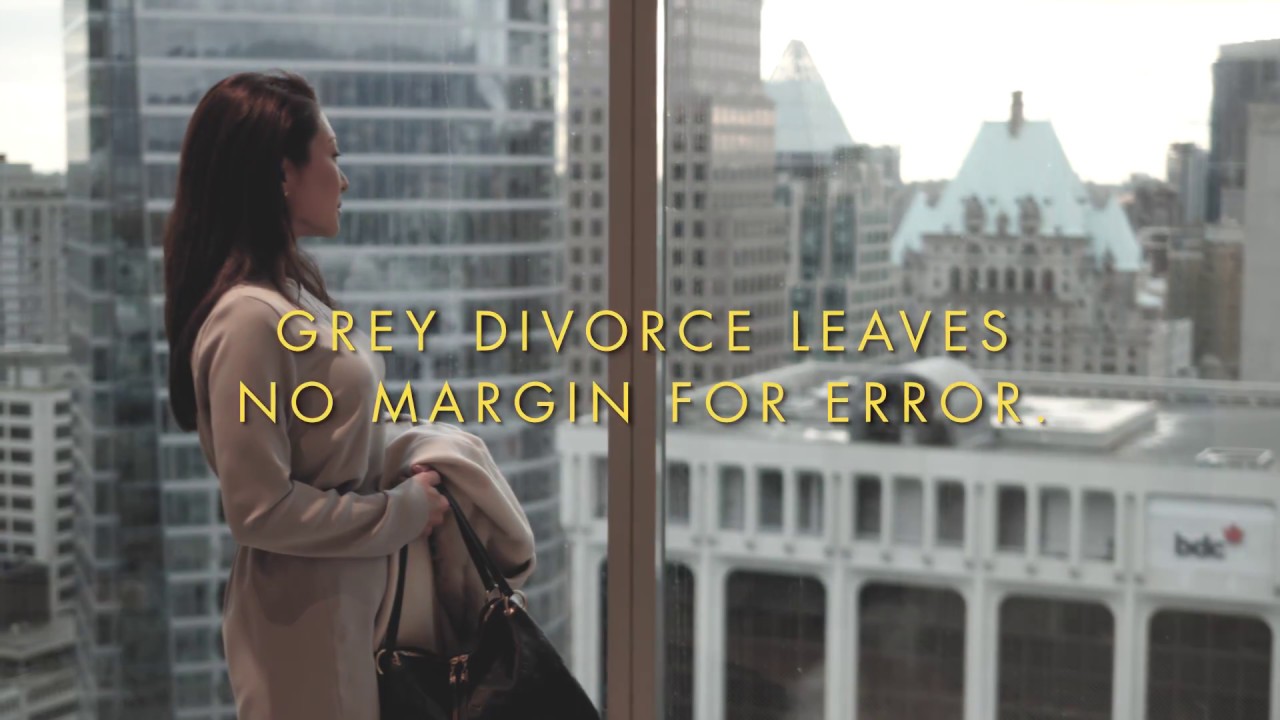
When Does Spousal Support Stop? Our BC and Alberta family lawyers get asked this question hundreds of times. Peter Graburn our Senior Calgary high net worth family law lawyer explains this thorny topic today. If you have a question concerning termination of spousal support, call us early on in your case. Click here to get started.

Spousal support is governed both the Federal and Provincial support legislation and also relies upon the Child Support Guidelines for calculation of income and the Spousal Support Advisory Guidelines. In settling cases the end point for spousal support also called termination of spousal support is often the most hotly debated topic. Lawyers often resort to a review afresh of spousal support some years down the road to help get all the issues except for the end date of support settled in high net worth financial cases. Lorne MacLean, KC of our office acted for the husband in the infamous Leskun v Leskun decision of our Supreme Court of Canada. In that case the SCC said reviews should be sparingly used but lawyers and judges since this controversial decision have not found that approach to be at all helpful, and spousal support reviews are now very common. So, when does spousal support stop? And how does termination of spousal support work?
When Does Spousal Support Stop in Vancouver and BC? Tel: 604 602 9000
Lorne MacLean, KC, Fraser MacLean and the other lawyers at our Vancouver flagship office understand spousal support can be a contentious issue in separation and divorce. They recently won a dismissal of a spousal support claim by a wife after a very long term marriage and the ex- wife was ordered to pay our client hundreds of thousands of dollars in retroactive child support. WE were successful in imputed an income to her in the hundreds of thousands per year. The Court held:
[410] First of all, I conclude that income needs to be imputed to the claimant [ex-wife] because she is intentionally severely underemployed. I find that the decline in her billings over the years was due to a combination of her resentment at being excluded from the clinic she shared with the respondent, an obstinate refusal to adapt herself to the changing conditions of her employment, and a lack of urgency supported by the income from her real estate sales. Her higher billings in the years immediately following her exclusion from the clinic are an example of what she is reasonably capable of, and I reject her assertion that she requires 24/7 support for her material needs from her relatives in order to achieve it, as she suggested.

As we have previously indicated (see: Retroactive Spousal Support and Delay – ), spousal support can often be the ‘elephant in the room’ in family law proceedings: some don’t want to raise the issue; some don’t want to claim it; some don’t want to pay it. The reason may be simple. Once an entitlement to receive spousal support is established, the question(s) then become: how much; how long, and; how is it to be paid (ie. periodic or lump-sum)? If periodic (ie. monthly), for how long? Generally, a short-term relationship warrants short-term support. But a long-term relationship (ie. longer than 16-18 years) may warrant long-term (even indefinite) support. So once started, when does spousal support end? When will termination of spousal support occur?
What is Vancouver and Calgary Spousal Support?
The principle behind spousal support is also simple. As indicated in s. 15.2(6) of the Divorce Act, the objective of a spousal support Order is to compensate for the financial consequences of the breakdown of the relationship (living costs, cost of raising children, lost economic opportunities, attempts to attain self-sufficiency, etc.). But the payment of spousal support is not intended to be forever. As indicated by the Alberta Court of Queen’s Bench (as it then was) in the case of VS v. AK (2005 ABQB 754 at para. 20):
“a person does not acquire a lifetime pension as a result of marriage. Likewise, marriage is not an insurance policy.”
So what happens if circumstances change after spousal support is started to be paid (ie. change of jobs/income, disability/illness, remarriage/retirement, etc.)? Once started, when (and how) does spousal support end?
Divorce Act
Section 17(1) of the federal Divorce Act permits a Court to vary, rescind or suspend an existing spousal support order. However, s.17(4.1) states:
(4.1) Before the court makes a variation order in respect of a spousal support order, the court shall satisfy itself that a change in the condition, means, needs or other circumstances of either former spouse has occurred since the making of the spousal support order…
Section 17(4.1) is important because it distinguishes between two (2) different possible changes to an existing spousal support Order (and perhaps, more importantly, the tests to applied in each): Variation or Review.
Variation or Review?
A variation of a spousal support Order may be sought when some unforeseen circumstance (ie. loss of employment, illness, bankruptcy, etc.) occurs to either spouse. In a variation application, the spouse requesting the change must show there has been not just a change in circumstances [s. 17(4.1)] but a material change that was not contemplated when the original spousal support Order was granted and, if known at the time, would likely have resulted in a different spousal support Order being granted (GL v. BG, [1995] 3 SCR 370). The change must be likely to continue, not temporary.
On the other hand, a review of a spousal support Order can occur automatically after a specified period of time or upon a specific event happening (re-marriage, retirement, etc.). In a review application, neither spouse need show a material change in circumstances, only that the conditions that would trigger the review are present. The Court will then take a “fresh look” at the current circumstances of the parties [as well as the objectives of spousal support set out in s. 15.2(6) of the Divorce Act (discussed above)] to determine whether the spousal support Order should be continued, changed or terminated.
When Does Spousal Support Stop in Calgary and Alberta? Tel: 403 444 5503
So under Section 17(1) of the Divorce Act, a spouse can bring an application to continue, vary or terminate a spousal support order. Variation, sure – unforeseen circumstances happen, things change, spousal support Orders may need to be varied accordingly.
But Reviews? Generally, Courts try to fix spousal support in order to set certainty and finality of that payment for both parties. The current law on reviews of spousal support Orders was set out in the 2006 Supreme Court of Canada case of Leskun v. Leskun (2006 SCC 25), which generally disapproved of reviews of spousal support Orders, stating (at para. 39):
“(A) trial court should resist making temporary orders (or orders subject to “review”) under s. 15.2 … Insofar as possible, courts should resolve the controversies before them and make an order which is permanent subject only to change under s. 17 on proof of a change of circumstances. If the s. 15.2 court considers it essential (as here) to identify an issue for future review, the issue should be tightly delimited in the s. 15.2 order. This is because on a “review” nobody bears an onus to show changed circumstances. Failure to tightly circumscribe the issue will inevitably be seen by one or other of the parties as an invitation simply to reargue their case…”
But more recently, some Courts have started to take a different view of the merits of reviews of spousal support Orders than set out in Leskun. In BC, in the 2016 case of Toth v. Toth (2016 BCCA 50) (see: Review of Spousal Support https://macleanfamilylaw.ca/2016/02/27/spousal-support-review/ ), the BC Court of Appeal, addressing the possible economic uncertainty of both spouses at the time of making the original spousal support Order (s. 15.2(6)(a-c) of the Divorce Act), stated (at para. 12):
“The principles governing review orders were summarized as follows by the Supreme Court in Leskun at paras. 36-39. Such orders have a “useful but very limited role” in cases in which “genuine and material uncertainty” at the time of the original order or agreement indicates that the economic circumstances of one or both parties are not yet stable and further changes are anticipated. In such cases, a term permitting the parties to return to court for a review of spousal support may be justified. Courts should exercise caution, however, in making such orders, as a permanent resolution of entitlement to support is preferable. If a provision for review is made, it should clearly and narrowly identify the issue for review to avoid full re-argument by the parties.”
Similarly, in Newfoundland, in the 2014 case of Marche v. Wagstaff (2014 NLCA 28), the Newfoundland and Labrador Court of Appeal (in a minority decision) supported the merits of a review application in addressing the spousal support recipients attempts (or lack thereof) at becoming economically self-sufficient (s. 15.2(6)(d) of the Divorce Act), stating (at para.’s 33-37):
“The courts have recognized that there are some circumstances when economic self-sufficiency is not a viable goal, such as, for example, cases of debilitating illness or a long-term marriage where the spouse is of an age, education or experience that employment options are limited at best… The courts have also recognized that at the time of separation and divorce it is difficult to predict the factors that may impinge on the ability of a spouse to attain economic self-sufficiency (Miglin v. Miglin). For this reason, a spousal support order may provide for a review after a period of time, four years in this case, at which point, spousal support may be terminated, continued or varied.. By ordering a review after four years, Butler J. must be taken to have meant that an assessment of Ms. Wagstaff’s progress regarding economic self-sufficiency would be meaningful at that time.”
Spousal Relationships An Economic Partnership
So, once started, when does spousal support end? As indicated above, not everyone has the same view regarding the payment of spousal support (hence the ‘elephant in the room’). At its most basic level, spousal support is designed to relieve the financial consequences experienced by both spouses upon the breakdown of their family and economic partnership. This does not happen over-night, particularly in long-term relationships. Similarly, what the future holds for these spouses, once their partnership ends, usually cannot be seen at the time of separation. Hence the ability to both vary and review a spousal support Order. Termination of spousal support issues will bedevil parties and lawyers long into the future.
When Does Spousal Support Stop?
Clearly, times and terms of a review of spousal support should be specifically set out in the Order or Agreement requiring the payment of spousal support. Certainty and finality of that payment is important, for both parties. But so is the ability to take a ‘second look’ at that payment after some of the ‘dust’ has settled from the breakdown of the spouses’ partnership. Fairness and respect of the partnership requires it.








